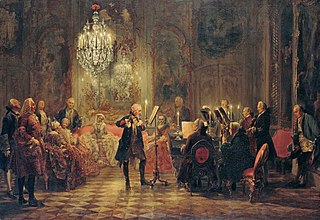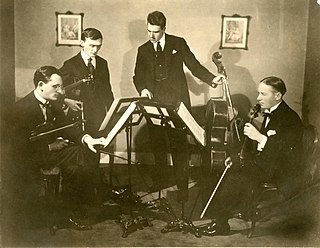
Chamber music is a form of classical music that is composed for a small group of instruments—traditionally a group that could fit in a palace chamber or a large room. Most broadly, it includes any art music that is performed by a small number of performers, with one performer to a part. However, by convention, it usually does not include solo instrument performances.

A string quintet is a musical composition for five string players. As an extension to the string quartet, a string quintet includes a fifth string instrument, usually a second viola or a second cello, or occasionally a double bass.
The Takács Quartet is a string quartet, founded in Budapest, Hungary, and now based in Boulder, Colorado, United States.
A piano sextet is a composition for piano and five other musical instruments, or a group of six musicians who perform such works. There is no standard grouping of instruments with that name, and compared to the string quartet or piano quintet literature, relatively few such compositions exist. The best-known piano sextet is probably the Sextet by Poulenc, one of the pinnacles of the wind and piano repertoire. Chausson's Concert is widely regarded as one of the masterpieces of French strings and piano chamber music literature.
The National Gramophonic Society (NGS) was founded in England in 1923 by the novelist Compton Mackenzie to produce recordings of music which was ignored by commercial record companies. The Society was proposed shortly after Mackenzie had launched his monthly The Gramophone, and its activities were announced and its releases promoted in the magazine's pages.
Arnold Atkinson Cooke was a British composer.

Heinrich Picot de Peccaduc, Freiherr von Herzogenberg was an Austrian composer and conductor descended from a French aristocratic family.
Steven Dann is a Canadian violist.
The Quintetto Chigiano or Chigi Quintet was an Italian musical ensemble comprising a string quartet with pianoforte, founded in 1939 and active until 1966, when it was reformed as the Chigiano String Sextet. Led by Riccardo Brengola, it was first assembled by Count Guido Chigi-Saracini out of his Accademia Musicale Chigiana at Siena in Tuscany, Italy, but developed a worldwide acclaim.

The London String Quartet was a string quartet founded in London in 1908 which remained one of the leading English chamber groups into the 1930s, and made several well-known recordings.
The Léner String Quartet, sometimes written the Lehner String Quartet, was a string quartet of Hungarian origin, founded in Budapest in 1918, which for most of its pre-war career operated in or from London. They appeared at the Royal Albert Hall, London on three occasions between 1922 and 1926. They also performed in New York, Amsterdam, and elsewhere in Europe. The Léner made the first complete recorded cycle of Beethoven quartets.
The Pro Arte String Quartet is a string quartet founded in Belgium, which became affiliated with the University of Wisconsin-Madison in 1941.

Alfred Charles Hobday was an English viola player who made his career in England. He was the elder brother of the double-bass player Claude Hobday.
The Melos Ensemble is a group of musicians who started in 1950 in London to play chamber music in mixed instrumentation of string instruments, wind instruments and others. Benjamin Britten composed the chamber music for his War Requiem for the Melos Ensemble and conducted the group in the first performance in Coventry.
Richard Henry Walthew, often known as Richard H. Walthew was an English composer and pianist, and an important figure in English chamber music during the first half of the 20th century.
Cecil Aronowitz was a British viola player, a founding member of the Melos Ensemble, a leading chamber musician and an influential teacher at the Royal College of Music and the Royal Northern College of Music.
Samuel Carlton Cooley was an American violist and composer.
Ivor McMahon (1924–1972) was an English violinist. He played with notable orchestras including the Philharmonia Orchestra and the English Chamber Orchestra and is best known for playing second violin in the Melos Ensemble.

The Pražák Quartet is a Czech string quartet established in 1974. It is one of the Czech Republic's premiere chamber ensembles. It was founded while its members were still students at Prague Conservatory (1974–1978). The quartet was awarded First Prize at the Evian International Competition in 1978 and the Prague Spring Festival Prize in 1979 with second places not being awarded at both the competitions to indicate the difference in level.
Bernard Zaslav was an American viola soloist and chamber musician with an extensive recording and performance career. A founding member of The Composers Quartet in 1965, he went on to play with the Fine Arts Quartet, Vermeer Quartet, and the Stanford String Quartet. He has also performed and recorded as the Zaslav Duo with his wife, pianist Naomi Zaslav.





